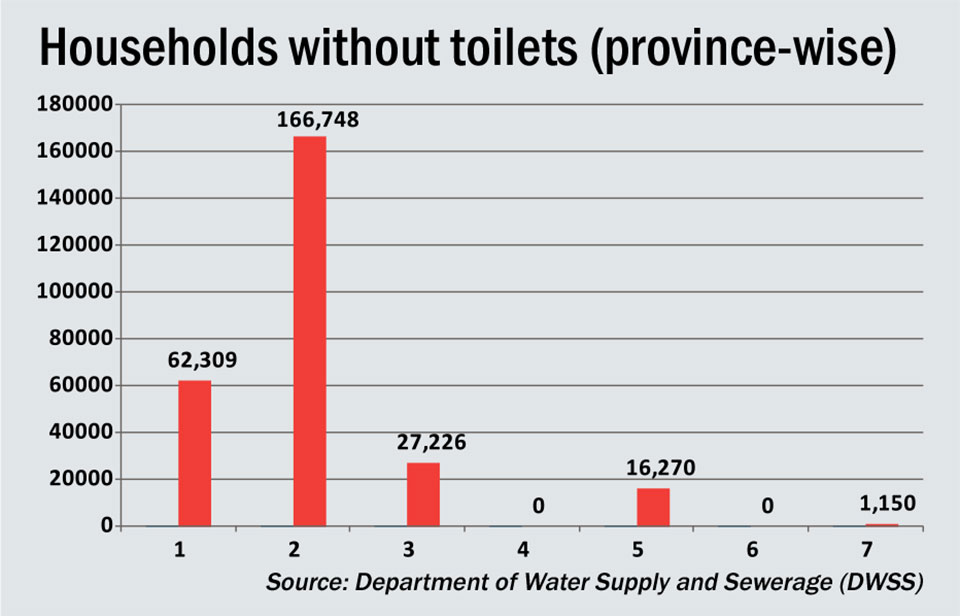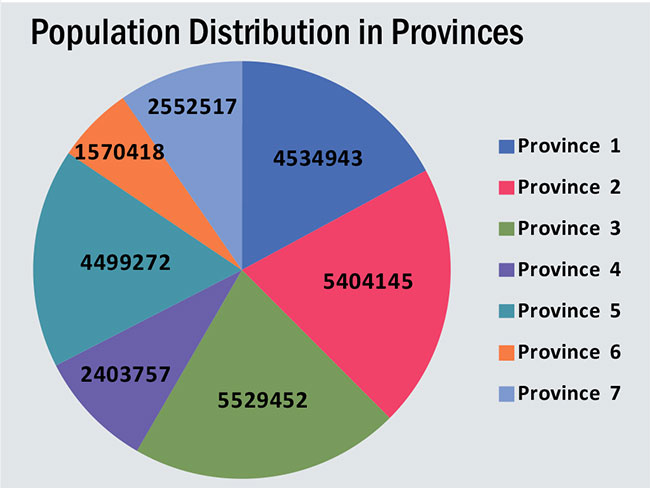
OR
273,703 households nationwide don’t have a toilet
Published On: February 5, 2018 11:58 AM NPT By: Bishnu Prasad Aryal

KATHMANDU, Feb 5: A total of 273,703 of the 5,373,800 households in the country do not have a toilet, according to government data. Similarly, among the seven provinces, Province 2 has the highest number of people practising open defecation while every household in provinces 4 and 6 has at least one toilet.
 According to the Department of Water Supply and Sewerage (DWSS) under the Ministry of Drinking Water and Sanitation, there are a total of 5,373,800 households across the country. Among them, 5,100,097 (94.91) households have at least one toilet while 273,703 households do not have toilets at all. A total of 5.09 percent households in the country still practice open defecation.
According to the Department of Water Supply and Sewerage (DWSS) under the Ministry of Drinking Water and Sanitation, there are a total of 5,373,800 households across the country. Among them, 5,100,097 (94.91) households have at least one toilet while 273,703 households do not have toilets at all. A total of 5.09 percent households in the country still practice open defecation.
A total of 17.90 percent of the 931,754 households in Province 2 practice open defecation. Most of the districts where open defecation is practiced are in the tarai region, according to the DWSS.
Of the total 77 districts in the country, 47 have been declared open defecation free (ODF) zones since the beginning of the ODF campaign in 2011 while 11 districts have completed the preparations for it. So far, 569 of the total 753 local units have been declared ODF zones.
A total of 36,834 of the 108,334 households in Bara district don’t have toilets. Kaski district with 108,481 households was the first one to be declared an ODF zone on June 24, 2011.
The districts which are yet to complete the construction of toilets to be declared ODF zones are Sunsari, Jhapa, Morang, Saptari, Siraha, Rautahat, Dhanusha, Mahottari, Sarlahi, Parsa, Bara, Sindhuli, Nuwakot, Ramechhap, Sindhupalchowk, Dhading, Dolakha, Kavrepalanchowk, Kathmandu, Rupandehi, Banke, Kapilvastu and Kailali.
The country with a population of more than 29 million has a total of 4,108 government health facilities. Province 2 has the highest number of health facilities (789) while Province 6 has the lowest number of health facilities (362).
Province 1 has a total population of 4,534,943, Province 2 has 5,404,145, Province 3 has 5,529,452, Province 4 has 2,403,757, Province 5 has 4,499,272, Province 6 has 1,570,418 and Province 7 has a population of 2,552,517, according to the Central Bureau of Statistics (CBS).
However, the country is yet to meet the toilet coverage target under the UN Millennium Development Goals (MDG). Toilet coverage is 93.63 percent in Province 1, 82.10 percent in Province 2, 97.85 percent in Province 3, 100 percent in Province 4, 98.16 percent in Province 5, 100 percent in Province 6, and 94.91 percent Province 7.
The government failed to meet the target of the UN Millennium Development Goals that planned to construct at least one toilet in each household by 2017 though millions of rupees is spent annually on the ODF campaign.
The government allocates Rs 350 million annually for sanitation including about Rs 220 million for the ODF campaign, according to the DWSS. The donors, INGOs and NGOs spend annually more than the government for the same purpose.
“The government spends on awareness programs but does not provide grants to people,” said Prem Krishna Shrestha, chief of the Environmental Sanitation Section of the DWSS. “We tried to get the records of funds spent by donors, INGOs and NGOs on the ODF sector but in vain,” he added.
“We are planning to achieve the target by 2019,” said Dinesh Kumar Thapaliya, secretary at the Ministry of Federal Affairs and Local Development. “The local bodies will work to meet the target,” he added.
The UN has already implemented the Sustainable Development Goals (SDGs) after the completion of MDG period. “The SDGs is a concept to maintain full sanitation after the completion of the MDG target,” said Thapaliya. “Now, we have to work on both until the targets are met.”
Dr Shree Krishna Giri, spokesperson for the Ministry of Health, said that toilets are mandatory requirement as sanitation falls under the health indicators.
“Every household must have at least one toilet which must be used to prevent contamination and communicable diseases like Hepatitis and diarrhea,” said Dr Giri. “Water, vegetables and food can be contaminated due to open defecation,” he added, “As a result, we have to suffer from various diseases which can kill us.”
You May Like This

232 community schools in Rolpa don't have govt-assigned teachers
ROLPA, Nov 10: Out of the total 407 community schools in Rolpa district, 232 schools do not have any government-assigned teachers. Read More...

The new forces don’t have clear stands on core political issues
Hari Sharma has closely observed Nepali politics from both in and out of government and is widely known for his... Read More...



Just In
- World Malaria Day: Foreign returnees more susceptible to the vector-borne disease
- MoEST seeks EC’s help in identifying teachers linked to political parties
- 70 community and national forests affected by fire in Parbat till Wednesday
- NEPSE loses 3.24 points, while daily turnover inclines to Rs 2.36 billion
- Pak Embassy awards scholarships to 180 Nepali students
- President Paudel approves mobilization of army personnel for by-elections security
- Bhajang and Ilam by-elections: 69 polling stations classified as ‘highly sensitive’
- Karnali CM Kandel secures vote of confidence















Leave A Comment